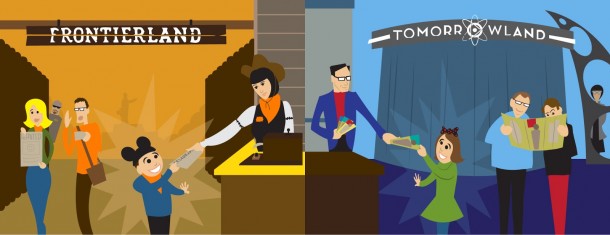MiceChat reader, Nick Tierce, sent us the following article in honor of the last day of Disneyland’s Legends of Frontierland game. If you’ve got a bit of time to spare today (September 27, 2014), stop by Frontierland and check out the festivities.
Disneyland’s “Legends of Frontierland” has blazed a new trail for interactive theme park experiences.
Offering participants the chance to step into a living, breathing frontier town, they are invited to become a “citizen” and help shape the unfolding story.
As a participatory form of storytelling still in its infancy, this type of experience can be difficult to describe, even for Disney. Innovation has taken Imagineers so far off the beaten path that we scarcely have the language to describe it. Is it an Alternate Reality Game? Live Action Role-play? Living Story Worlds? Interactive Adventure?
The introduction of any new media entails an awkward transitional period when the previous generation insists on defining the new in terms of the old. However, the future of these live experiences will not be found in their similarity to films, video games, or theatre. It will be forged from the unique attributes that it singularly offers.
As an enthusiast of this narrative form, I have long held that the issue of what to call these “things” … doesn’t really matter. Day after day, “Legends of Frontierland” has proven this in spades. The often confused and occasionally scornful faces seen around Frontierland are exclusively adult. It is only their stubbornly delineating mentality that requires any explanation. As with so many pioneering concepts in Walt’s magic kingdom, here wisdom comes from the mouth of babes.
The kids who mosey into Frontierland need no instruction. They dive in and find their way, through play. The purity of their curiosity is met with an intuitiveness of game mechanics that require no further explanation.
This is not to say that “Legends” was without its growing pains. Thanks to the live nature of the gameplay, it has proven itself nimble enough to adapt under pressure. The design of its experience was finessed as the growing community felt the edges of the map, exposing areas of awkwardness or stress. In one such instance, after players created a “welcome wagon” to help new citizens get started, official tutorial quests were introduced at the game’s stations.
My primary personal observation in terms of what could be improved upon for WDI’s next interactive chapter (in Frontierland or elsewhere) deals with the reconciliation of daily gameplay and the ongoing story elements. Like the television landscape’s divide between episodic and serialized storytelling, “Legends” struggles to find it’s narrative balance.
One of “Legends’” primary strengths is the intuitive forming of collaborative communities through gameplay. So much so, that the nominal episodic story content presented and concluded day-to-day is strained to sustain ongoing interest in the extended community that formed beyond the single-day players.
In one of several eloquent posts on “Legends,” player David Daut suggests that the seasonal nature of this kind of story is essential to preserve the experience. I would counter that, even if the larger story unearthed by return players exists in seasonal chapters, there’s no reason the base game can’t continue year-round as a casual drop-in, drop-out experience.
However, in its current form there is a crucial problem with maintaining any semblance of an ongoing story. Whether it’s uncovering an arsonous whodunit or the mystery of the land feud’s history, larger stories are given no space to breathe. Though alleviated somewhat with later changes to the game mechanics, a fundamental divide exists between the actions of the daily game, and the nature of the continuing story. The former exists casually on the streets of Frontierland, the latter relegated to dialogue-based interactions between cast members and players. Rarely do the two overlap.
Until the story is essential to the experience, and integrated into the physical space alongside the daily gameplay, the ultimate potential of “Legends” will remain unexplored. As it stands, the character elements are fun, but play as inconsequential bouts of soap-opera sprinkled on top of a disconnected game. Whatever form this takes in the future, I hope we can expect a level of story integration on par with the platform-spanning wonder of last year’s “The Optimist.” (Disney’s first significant foray into Alternate Reality Games.)
I can only imagine how invaluable of an experiment this has been for WDI. After making an impressive splash with “The Optimist,” “Legends” represents the next step toward permanent, interactive experiences in the parks. These incomparable adventures have taken familiar spaces and cast them in a new light, through the participatory exploration of story.
If I may be so bold as to project speculation decades down the road, I can imagine a future where — rather than grafting these experiences onto existing locations — original themed environments will be constructed to exclusively house this type of open, immersive, exploratory story world.
The prospect of Disney being at the forefront of this revolution fills me with a sort of (dare I say it) optimistic pride and excitement. The kind generally reserved for nostalgic reminiscences of Walt’s time, when “story” wasn’t conflated with “plot,” and a “theme park” was the ineffable new concept.
Just as Film escaped the shadow of Theatre, and Television escaped the shadow of Film, Gaming has finally begun to abandon its futile ties to past modes of storytelling. The next generation who sees no hierarchy of media from which they receive their stories — their cultural mythology — will usher this new form into prominence.
As our stigmas fall into extinction, these future audiences won’t only understand and accept this type of storytelling experience, they will expect it.
And it starts here. On a single strip of Western road. With an experience that dared to do something new. And a company with a legacy of innovation that dared to foster it.
That’s the new storytelling frontier, and it truly is the stuff of legend.





You must be logged in to post a comment.